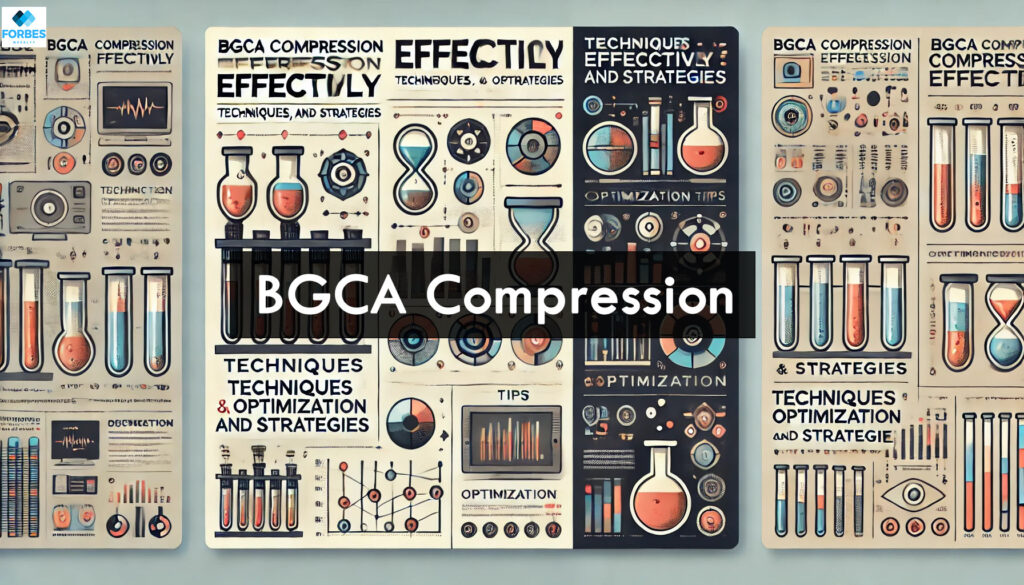Considering that the technical progress is expanding at a rather fast speed, there is a regular need to settle for less when storing and transmitting information.That’s why one of the recently emerging techniques is called the BGCA Compression. Both with digital media and big data analytics, as well as with software development, the knowledge of how works and what positive effect it can produce when applied can significantly help with the effective work and management of data.
In what follows, we shall consider the details in this article, including its function, operation, and applications. For a better understanding of this new technology, we will also provide the most common questions about it.
What is BGCA Compression?
BGCA Compression therefore is a special type of data compression that adequately compresses larger data and is easily compressible while maintaining the integrity of data. This technology is especially useful in sectors where there is a considerable amount of data to be warehoused or passed through with low usage of bandwidth. Efficient algorithms, contained in the BGCA, allow data to be compressed to a minimum of loss, thus providing a more efficient way to store and transfer data.
The Mechanism Through Which Compression of BGCA Occurs
In principle, BGCA Compression** uses a range of methods that can be applied to reach adequate data compression. The key mechanisms include:
1. Entropy Encoding: It is a method which encodes the data in a way that the more frequently used elements have less bits allocated to them than the less frequently used ones. This goes a long way in ensuring that the space required to store, or transmit the data is highly reduced.
2. Dictionary Compression: By way of this method, BGCA forms a dictionary of frequently used data pattern replacements that uses shorter codes. This means that the amount of data to be analyzed is greatly reduced in size.
3. Lossless Compression: Just as the name suggests BGCA, one of the most amazing qualities of this method is that it can compress the file as many times as needed without breaking the file compression rules. BGCA Compression is completely different from other methods of lossy compression because it retains all of the data: This makes it useful in any application where data might be required.
How BGCA Compression Works
When you apply BGCA Compression, the algorithm initially performs scanning so as to identify patterns/repetitions. It then creates another dictionary which links these patterns to be shorter codes. These codes are in contrast to the actual data and lead to the reduced file size of overall data. The use of data compression involves reducing data size and so can be transmitted or stored with less effort.
For decompression the same process is carried out in a reversal manner. The output is read then expanded to the full representation via the dictionary used in the compression stage. This lossless process ensures that the data that is decompressed is as good as the compressed data.
Main advantages of BGCA compression
The main reason why the service has become popular with users is that BGCA Compression has many advantages. Some of the key advantages include:
1. Lowered Costs of Storing Data
Compression is very effective in that it shrinks large datasets requiring a lot of storage space in organizations. In directions, this can make for truly gigantic savings, especially when coping with massive data sets.
2. Faster Data Transmission
While in many industries including telecommunication and cloud computing the only name for the game is to quickly transmit large files. BGCA makes it possible to send data at a faster rate while still being in a position to match with the intended quality and ability to pass through scrutiny.

3. System Optimization Advantage
Given that BGCA Compression filters out lots of data, more systems can perform optimally, given less hardware needed to store and transmit such data. Such can be useful especially in situations where network connection speed and computational capacity is not very good.
4. storage consistency
As it has been observed that there is no loss of data during the compression, BGCA Compression is different from some other compression algorithms in the sense that it is lossless. This makes it suitable whenever data precision and reliability is paramount – data that will be used for medical, financial, research, and or any other sensitive data.
Illustrations of BGCA Compression
BGCA Compression can be implemented across various business domains and contexts. Some of the most common applications include:
1. Data Archiving and Backup
To the business and individual entities that may require storing huge volumes of data, BGCA Compression avails for shrinking the space occupied by data. This can assist in decreasing expenses associated with long term storage with data and guarantee that the information is accessible, where necessary.
2. Multimedia Compression
As we observed in video streaming, gaming, and the production of video, audio, and image content, this feature makes significant sense. BGCA Compression can be applied where such media files need to be compressed in order to enhance download speed as well as the efficiency of streaming.
3. Cloud Computing and Big Data
Today, with cloud computing and big data becoming more prominent, organizations have to handle bigger datasets. For example, BGCA Compression, is very important in decreasing the storage demands of cloud servers and databases that form the backbones of most businesses today helping organizations store large volumes of data efficiently.
4. Data communication channel optimization
In a centralized environment where available network bandwidth is relatively small, BGCA Compression is useful because data transfer in a network takes less time since less data is transferred. This is especially beneficial for cloud-based working, cloud services, as well as the IoT devices whose utilization depends on data transfer.
The Future of BGCA Compression
Since technology development is not going to slow down anytime soon, there will be pressure for data compression methods to improve. Due to increased use of cloud solutions, big data, and digital media, BGCA Compression is anticipated to be an essential factor in the further development of data storage.
Ongoing Algorithms Advances
The key to understanding BGCA Compression is the constantly improving algorithms that improve the compression ratio without skewing the data. As future work, it is possible to predict future versions of BGCA, which will be even capable of handling the significantly larger data sets.
Pasowanie z AI i ML
This phenomenon has created one of the biggest opportunities for the future of BGCA Compression based on artificial intelligence and machine learning. It is possible to use learning technologies to improve the efficiency of the data compression stage, where the compression algorithms are selected based on the type of data in the set and the patterns of change in these data are determined automatically.
Conclusion
BGCA Compression is a recommended tool for anybody that has large data, the advantages given below include; compression ratio: there is huge compression, meaning that the data stored requires lesser storage space and hence we compressed more * efficiency: data delivery is carried out with efficiency since the data takes up less space * reliability: the data is not altered when transmission is under way, therefore making it reliable Regardless of the nature of your tasks and projects, ICT data archiving, multimedia production, cloud computing, among them, integrating BGCA would be very beneficial to your function.
As data becomes bigger and more complicated thus taking more space BGCA Compression is the only solution that makes data easier to be commanded by business entities or individuals. Using this technology, customers can improve productivity, realize performance and cost improvements, all without compromising the completeness of their database.
Frequently Asked Questions (FAQ)
What makes BGCA Compression better than the other methods of compression?
The major strength of BGCA Compression is that it is a lossless compression technique. BGCA Compression does not, however, lose any of the original data as other compression methods fail to be able to achieve higher levels of compression.
Is it possible to compress any type of data with the usage of BGCA Compression?
Yes, BGC is resilient and can be adapted for almost any type of data – from text to images, audio to video files*. Due to the feature of data integrity, it is feasible for use in applications that maintain the quality of data used.
How the use of BGCA Compression affects system performance?
As a consequence, resulting in its decrease, BGCA Compression can enhance the systems’ performance. As a result of the need to use less storage space and bandwidth, system implementation is more effective and the likelihood of network overcrowding or system saturation is also diminished.
Can BGCA Compression be used for real time data compression?
Yes, for circumstances for which the transfer of data has to happen as quickly as possible BGCA Compression can be implemented in a real time environment for instance when data is to be transmitted through stream or live data situations. Its non-degrading nature of data quality makes it appropriate in cases that require real-time data compression.
Is there data loss if it is to be taken through the BGCA Compression?
No, BGCA is one of the lossless algorithms implying that no data is being lost in the course of compression or decompression. The results that I obtained using the numerical algorithms are identical to the original data.
How is the performance of BGCA Compression with respect to other compaction methods such ZIP or RAR?
While ZIP and RAR are known file compression methods, BGCA is developed particularly for the big datasets and therefore yields better outcomes both in question of compression and dataset quality. It is most valuable in industries where every single piece of information has to be retained, for example in healthcare or scientific research.
All in all, BGCA solves the existing challenge in data management and importation in today’s world in an efficient, cost effective and faster method in the various industries.


